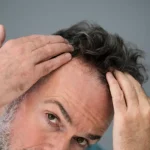
Hair loss can be a distressing experience, especially when it arises suddenly and without a clear cause. For many individuals, alopecia is more than a cosmetic concern—it’s a medical condition deeply rooted in the body’s immune system. Understanding the connection between immune function and hair loss is essential for those navigating alopecia, particularly alopecia areata, an autoimmune form of the condition.
This article explores how the immune system contributes to hair loss, the broader implications of autoimmune disorders, and the resources available to support those affected.
Understanding Alopecia and Autoimmunity
Alopecia areata is classified as an autoimmune disorder, meaning the body’s immune system mistakenly attacks its own tissues—in this case, the hair follicles. Normally, the immune system defends the body against harmful invaders like bacteria and viruses. However, in autoimmune conditions, this defense mechanism misfires, targeting healthy cells instead. In alopecia areata, this results in inflammation around the hair follicles, which disrupts the normal hair growth cycle and leads to hair loss in small, round patches. In more severe cases, it can progress to alopecia totalis (complete scalp hair loss) or alopecia universalis (total body hair loss).
The exact cause of this immune misdirection is not fully understood, but it is believed to involve a combination of genetic predisposition and environmental triggers. Individuals with a family history of autoimmune diseases are more likely to develop alopecia areata, and stress or illness may act as catalysts for its onset.
The Broader Impact of Autoimmune Disorders
Alopecia areata does not exist in isolation. Research shows that individuals with this condition are at a higher risk of developing other autoimmune diseases, such as thyroid disorders, vitiligo, lupus, and type 1 diabetes. This overlap suggests a shared genetic or immunological basis among these conditions. For patients, this means that managing alopecia may also involve monitoring for other potential health issues.
Moreover, autoimmune diseases often have systemic effects that go beyond the initial symptoms. Chronic inflammation, fatigue, and emotional stress are common among those with autoimmune conditions. For people with alopecia, the visible nature of hair loss can amplify psychological distress, affecting self-esteem and social interactions.
Immune System Health and Hair Regrowth

While there is no definitive cure for alopecia areata, understanding the immune system’s role opens the door to targeted treatments. Immunomodulatory therapies, such as corticosteroids, JAK inhibitors, and topical immunotherapy, aim to calm the immune response and allow hair follicles to recover. These treatments vary in effectiveness and may come with side effects, so working closely with a dermatologist is essential.
In addition to medical treatments, lifestyle choices that support immune health can play a complementary role. A balanced diet rich in anti-inflammatory foods, regular exercise, stress management techniques, and adequate sleep all contribute to overall immune regulation. While these measures may not reverse alopecia, they can enhance general well-being and potentially reduce flare-ups.
Lifestyle Tips to Support Immune Health:
- Eat a nutrient-rich, anti-inflammatory diet (rich in omega-3s, leafy greens, berries, and nuts)
- Practice stress management (meditation, yoga, deep breathing)
- Get adequate sleep (7–8 hours per night)
- Avoid smoking and excessive alcohol
- Exercise regularly to reduce inflammation and support circulation
These habits promote overall health and may help reduce the severity or frequency of autoimmune reactions.
Finding Support and Building Resilience
Living with alopecia can be emotionally challenging, especially when the condition affects appearance and identity. Support networks are crucial for coping and resilience. Connecting with others who understand the experience can provide validation, encouragement, and practical advice.
Organizations like the National Alopecia Areata Foundation (NAAF) and online communities such as Alopecia World offer resources ranging from educational materials to peer support groups. For those seeking immediate guidance or emotional support, the alopecia helpline is a valuable resource. It connects individuals with trained professionals and community advocates who can offer information, counseling referrals, and a listening ear during difficult times.
Support also extends to family and friends. Educating loved ones about the nature of alopecia and its emotional impact can foster empathy and reduce feelings of isolation. Open conversations help normalize the condition and create a more inclusive environment for those affected.
Advocacy and Awareness
Raising awareness about alopecia and its autoimmune roots is an important step toward reducing stigma and promoting research. Public education campaigns, social media advocacy, and participation in awareness events can help shift the narrative from one of shame to one of strength. Many individuals with alopecia choose to share their stories publicly, using their platforms to inspire others and advocate for better treatments and understanding.
In recent years, increased visibility of alopecia in media and popular culture has helped challenge traditional beauty standards and promote acceptance. This cultural shift empowers individuals to embrace their appearance and live confidently, regardless of hair loss.
Conclusion
Navigating alopecia involves more than managing hair loss—it requires understanding the immune system’s role, addressing emotional well-being, and building a strong support network. As research continues to uncover the complexities of autoimmune conditions, individuals affected by alopecia are finding new ways to cope, connect, and thrive. With the right resources, including medical care, lifestyle support, and community engagement, it is entirely possible to live a full and confident life with alopecia.
Photo Credit:
Photo 1, Credit to Freepik || Photo 2, Credit to Freepik (CC0 1.0)




